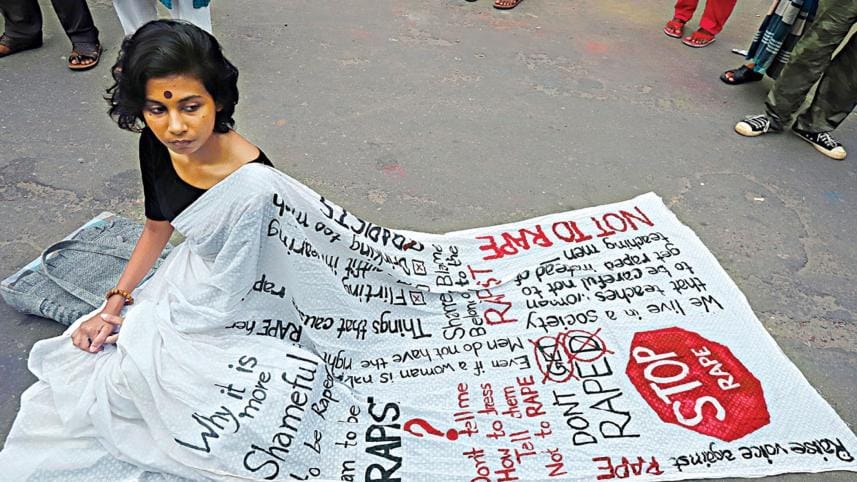Why the death penalty will do nothing to end impunity for rape

On October 13, the Women and Children Repression Prevention (Amendment) Ordinance 2020 was passed making some changes to our central law on violence against women and children. The most significant and discussed change is that it "introduces" the death penalty as the maximum punishment for single perpetrator rape under section 9(1) of the 2000 Act.
Before this amendment, the only available punishment for single perpetrator rape was a mandatory life sentence. Before we delve into the efficacy of this reform, two important points must be noted by way of contextualisation.
Firstly, popular discourse in support of the death penalty for rape (and therefore this reform) tends not to acknowledge that death penalty already existed as an available punishment for three out of the four categories of rape in our law, even before the amendment. That means, the death penalty was already prescribed as the maximum punishment for three of the more serious categories of rape under section 9 of the 2000 Act. These are: rape leading to death, gang rape, and gang rape leading to death. Therefore, the only form of rape which did not involve the death penalty was single perpetrator rape, perhaps owing to it being the least severe of the four categories. This contextualisation is important because many fail to realise that the death penalty was already available as a punishment for the Noakhali rape case which triggered the protests, since it was not single perpetrator rape, but a case of gang rape.
Secondly, this amendment does not "introduce" the death penalty for even single perpetrator rape, because section 6(1) of the Women and Children Repression Prevention (Special Provisions) Act 1995—which the 2000 Act repealed—had first introduced the death penalty for single perpetrator rape, which the 2000 Act removed. This is, therefore, a "reintroduction" of the death penalty for single perpetrator rape, and the existence of the death penalty for a single perpetrator for five years between 1995 and 2000 did not have any particularly significant impact on justice for rape.
Now coming to the central question: will this reform do anything to improve justice for rape? The short answer is no. The death penalty has already existed for the three other forms of rape for at least 25 years, but can we really say that has at all been able to decrease rape leading to death (such as Rupa and Tonu's cases) or gang rape (such as the recent Noakhali case)? Research by the Death Penalty Project, an international organisation, has shown that there is no evidence that the use or existence of death penalty has especially helped deter crime anywhere. Instead, research from around the world tends to show that increasing the severity of punishment tends to decrease conviction rates in criminal cases. This is because the more severe the punishment becomes, the more cautious and reluctant judges become in handing out guilty verdicts, since their judicial conscience tells them to exercise extra care by gaining extra surety. This effectively results in the standard of proof being pushed up in practice and only the most severe forms of the crime being recognised. Making the two most severe punishments in law—life imprisonment and death penalty—the only possible penalties for rape will, therefore, have two damaging effects. Firstly, it will push the standard of proof for rape to an unattainable standard. Secondly, it will lead to only the most severe rape cases resulting in conviction.
Rape is an offence that, due its very nature, is already incredibly difficult to prove. Most of the rape cases will not be equally brutal or have a video recording of the crime taking place, as in the Noakhali case. Following the amendment, the vast majority of rape survivors will be deprived of justice either because they are unable to satisfy this unattainable standard or their rape is not on the severe end of the spectrum, which therefore would mean the rapists get acquitted. This is because the law would not allow any alternative punishments. Allowing judges enough sentencing discretion to order punishment that is proportionate to the crime committed is a basic requirement in any justice system. Yet under our rape laws, our judges hardly have any discretion. Little wonder, then, that a report by Prothom Alo has shown that the conviction rate in rape cases filed in Dhaka's tribunals is only 3 percent.
The ongoing discussion about death penalty for rape makes two very big presumptions: that a rape survivor has been able to file a case and the trial has reached the ending point where the judge has to decide what punishment to give. Importantly, a multi-country study by UN agencies which interviewed rapists found that on average over 90 percent of respondents from Bangladesh reported facing no legal consequences for raping a woman or girl. This means that the vast majority of rape survivors are precluded from taking legal action in the first place. It would be foolish to think that the absence of death penalty for single perpetrator rape is what was deterring around 90 percent of rape survivors from taking legal action against their rapists. A more realistic answer would be the misplaced social stigma on rape survivors and their inability to file a rape case due to fear of facing violent reprisals from the rapists, who are usually more powerful—and the death penalty does nothing to address either of these. Due to space constraints, I will discuss only two reforms that could very much have addressed these two barriers to justice for rape survivors.
Firstly, since rape takes place due to a power imbalance, the rapist can utilise this very imbalance to preclude the survivor from seeking justice for the crime done to them, through use of threats or actual violence. Therefore, seeking justice then becomes akin to facing more violence. Rapists are able to do so because they know that once a rape survivor steps outside the police station after having filed the case, and returns home, the police is not bound to ensure their safety. They are fair game, yet again. If we had an effective victim and witness protection system, as proposed by the Law Commission as far back as 2006, then this would no longer be a problem, as it would then become the state's responsibility to ensure the safety and protection of not only rape complainants, but also witnesses who testify on their behalf. It would do so by posting police officials outside their residence to ensure safety, or providing them safe custody.
Secondly, section 155(4) of the Evidence Act 1872 specifically allows defence lawyers to raise questions about a rape complainant's character in open court, in order to undermine their credibility as a witness. In practice, this provision essentially allows the defence lawyer to use the very misplaced social stigma that a rape survivor experiences as a weapon to humiliate them to the point where they reach their breaking point and abandon legal proceedings to avoid further humiliation. This tactic shifts so much of the focus on a rape complainant's lifestyle, clothing and life choices that the rape survivor often feels they are the ones on trial, and not their rapist. Countries around the world have recognised the discriminatory and damaging impact such a legal provision can have on justice for rape, and have limited or completely prohibited the use of character evidence against rape complainants. For example, India and Pakistan, who inherited this same provision from our British colonisers, have already abolished it, while we have consciously retained it.
If we are serious about ensuring justice for rape survivors, we must introduce reforms which actually help achieve that objective. At the very least, our state must have in place a system which will ensure their protection throughout the justice-seeking process, and the state must repeal the colonial law which essentially puts a rape survivor on trial, instead of their rapist.
Taqbir Huda is a Research Specialist at Bangladesh Legal Aid and Services Trust (BLAST) and leads the Rape Law Reform Now campaign. Email: taqbirhuda@gmail.com




 For all latest news, follow The Daily Star's Google News channel.
For all latest news, follow The Daily Star's Google News channel.
Comments